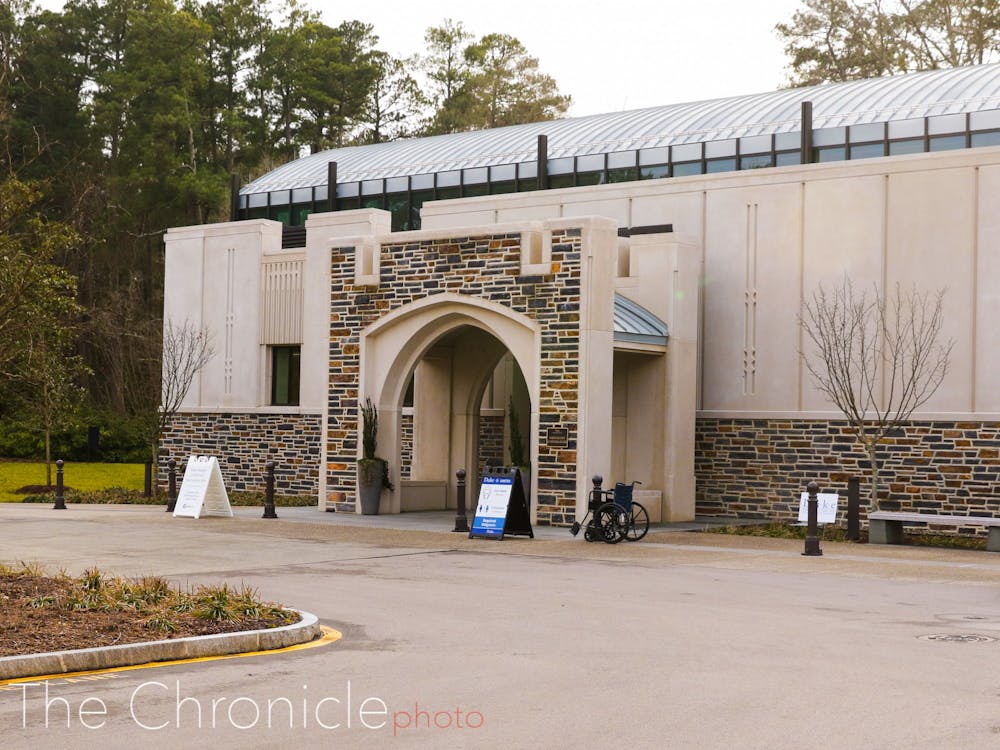As the vaccine rollout continues across North Carolina, students have answered the call to volunteer at one of Duke’s vaccination sites.
Last Tuesday, North Carolina Gov. Roy Cooper announced that North Carolina plans to significantly expand vaccine eligibility. On March 24, those belonging to group 4—including anyone 16-64 years old with one or more high-risk medical conditions for severe disease from COVID-19—will be able to secure a vaccine.
With demand set to soar, Duke Health needs volunteers at its vaccine distribution locations now more than ever. Hundreds of students have signed up to meet the need in various capacities at the Karsh Alumni and Visitors Center.
The Karsh Center has been providing vaccinations since the end 2020, and volunteers can perform a wide berth of tasks, including screening patients and even administering the vaccine—although the latter task requires some qualifications.
In addition to helping out, volunteering also opens up opportunities for students to get vaccinated themselves. At Duke’s vaccination sites, volunteers are eligible—but not guaranteed—to receive vaccines at the end of the day if unused doses are left over.
Senior Molly Apsel was one of the first undergraduate students to volunteer at the Karsh Center. She took on the role of organizing and directing patients in the clinic.
“After the patients were registered, they came to me and I pointed them to whichever vaccine station was open. I controlled the flow of traffic. If there were more people waiting than tables available, I made sure that people were in the correct order and were able to find everything,” Apsel said.
Apsel, who heard about the opportunity from her roommate, felt it was her responsibility as a Duke student to serve her community in any way possible. “For Duke students especially, it is very easy to close yourself off in the Duke bubble and not interact with the residents of Durham,” she said. “I think that going out of your way to serve local residents is really important in order to maintain a good relationship between Duke and Durham.”
Fellow undergraduate Philip Cho, a junior, has volunteered several times at the Karsh Center as a patient educator. As someone interested in pursuing a career in the medical field, he saw Duke’s vaccine distribution as the perfect opportunity to gain some clinical experience.
“After a patient receives a shot, they are guided toward a waiting area, where they sit for a minimum of fifteen minutes. During this time, they monitor themselves to watch for any negative reactions. My job is to inform them of the various symptoms that could potentially arise,” Cho said. “Should any of the symptoms occur, I then tell the patients how to appropriately respond.”
Cho also lauded the current vaccination process. “It is truly astonishing to see how efficiently we are able to vaccinate so many hundreds of people in so few hours. With each shot, you realize that we are one inch closer to normal life for everyone involved. Knowing that I am helping to put an end to the pandemic is a great feeling; that same feeling is what had me returning to help.”
Katrina Green, administrative director with the Duke University Health System, works closely with the COVID Volunteer Staffing Team, which oversees the volunteer coordination for vaccine distribution. Green was not at all surprised by the overwhelming response from Duke students.
“It has been tremendous to see all of the support from the Duke community,” Green said. “Throughout the pandemic, everyone has answered the call time and time again. It always gives us a sense of pride to see how eager Duke is to lend a hand with whatever is needed in order to keep the greater community healthy and safe.”
Although many undergraduate students may not perform certain clinical roles, student volunteers are essential in the many non-clinical positions required by a vaccination operation.
According to Green, “students have been a large part of support for roles like greeters and screeners. The more regularly students can give their time, the better it is for our patients and the less time our clinic leaders have to spend orienting volunteers.”
Student volunteers also contribute to Duke Health’s overarching goal: making vaccine distribution equitable and accessible.
“It is impressive to see our team members partnering with community leaders to host a number of pop-up clinics at schools, churches, and credit unions,” Green said. “These events really demonstrate our commitment to caring for our community outside of our own walls, and the progress in vaccine distribution reflects how much Duke truly lives up to its values.”
Get The Chronicle straight to your inbox
Signup for our weekly newsletter. Cancel at any time.

